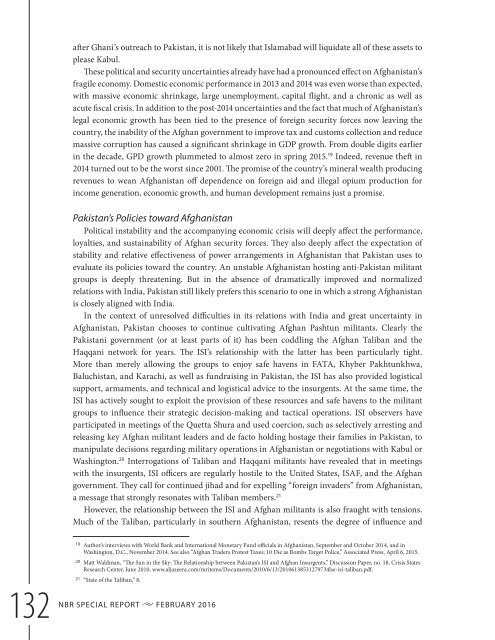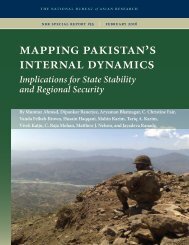pakistan’s
SR55_Mapping_Pakistan_February2016
SR55_Mapping_Pakistan_February2016
You also want an ePaper? Increase the reach of your titles
YUMPU automatically turns print PDFs into web optimized ePapers that Google loves.
ater Ghani’s outreach to Pakistan, it is not likely that Islamabad will liquidate all of these assets to<br />
please Kabul.<br />
These political and security uncertainties already have had a pronounced effect on Afghanistan’s<br />
fragile economy. Domestic economic performance in 2013 and 2014 was even worse than expected,<br />
with massive economic shrinkage, large unemployment, capital flight, and a chronic as well as<br />
acute fiscal crisis. In addition to the post-2014 uncertainties and the fact that much of Afghanistan’s<br />
legal economic growth has been tied to the presence of foreign security forces now leaving the<br />
country, the inability of the Afghan government to improve tax and customs collection and reduce<br />
massive corruption has caused a significant shrinkage in GDP growth. From double digits earlier<br />
in the decade, GPD growth plummeted to almost zero in spring 2015. 19 Indeed, revenue thet in<br />
2014 turned out to be the worst since 2001. The promise of the country’s mineral wealth producing<br />
revenues to wean Afghanistan off dependence on foreign aid and illegal opium production for<br />
income generation, economic growth, and human development remains just a promise.<br />
Pakistan’s Policies toward Afghanistan<br />
Political instability and the accompanying economic crisis will deeply affect the performance,<br />
loyalties, and sustainability of Afghan security forces. They also deeply affect the expectation of<br />
stability and relative effectiveness of power arrangements in Afghanistan that Pakistan uses to<br />
evaluate its policies toward the country. An unstable Afghanistan hosting anti-Pakistan militant<br />
groups is deeply threatening. But in the absence of dramatically improved and normalized<br />
relations with India, Pakistan still likely prefers this scenario to one in which a strong Afghanistan<br />
is closely aligned with India.<br />
In the context of unresolved difficulties in its relations with India and great uncertainty in<br />
Afghanistan, Pakistan chooses to continue cultivating Afghan Pashtun militants. Clearly the<br />
Pakistani government (or at least parts of it) has been coddling the Afghan Taliban and the<br />
Haqqani network for years. The ISI’s relationship with the latter has been particularly tight.<br />
More than merely allowing the groups to enjoy safe havens in FATA, Khyber Pakhtunkhwa,<br />
Baluchistan, and Karachi, as well as fundraising in Pakistan, the ISI has also provided logistical<br />
support, armaments, and technical and logistical advice to the insurgents. At the same time, the<br />
ISI has actively sought to exploit the provision of these resources and safe havens to the militant<br />
groups to influence their strategic decision-making and tactical operations. ISI observers have<br />
participated in meetings of the Quetta Shura and used coercion, such as selectively arresting and<br />
releasing key Afghan militant leaders and de facto holding hostage their families in Pakistan, to<br />
manipulate decisions regarding military operations in Afghanistan or negotiations with Kabul or<br />
Washington. 20 Interrogations of Taliban and Haqqani militants have revealed that in meetings<br />
with the insurgents, ISI officers are regularly hostile to the United States, ISAF, and the Afghan<br />
government. They call for continued jihad and for expelling “foreign invaders” from Afghanistan,<br />
a message that strongly resonates with Taliban members. 21<br />
However, the relationship between the ISI and Afghan militants is also fraught with tensions.<br />
Much of the Taliban, particularly in southern Afghanistan, resents the degree of influence and<br />
132<br />
NBR<br />
19 Author’s interviews with World Bank and International Monetary Fund officials in Afghanistan, September and October 2014, and in<br />
Washington, D.C., November 2014. See also “Afghan Traders Protest Taxes; 10 Die as Bombs Target Police,” Associated Press, April 6, 2015.<br />
20 Matt Waldman, “The Sun in the Sky: The Relationship between Pakistan’s ISI and Afghan Insurgents,” Discussion Paper, no. 18, Crisis States<br />
Research Center, June 2010, www.aljazeera.com/mritems/Documents/2010/6/13/20106138531279734lse-isi-taliban.pdf.<br />
21 “State of the Taliban,” 8.<br />
SPECIAL REPORT u FEBRUARY 2016



